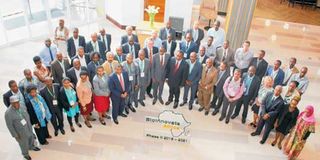Now stage set for Eastern Africa academia to trade in bioscience

Researchers, policymakers and innovators from Eastern Africa gather for the launch of phase II of BioinnovateAfrica project in Kigali, Rwanda, last week.
What you need to know:
As part of the countries in Eastern Africa, Tanzania is one of the stakeholders in bioeconomy, a sector that deals with economic activities derived from bioscience and research.
Kigali. When Eastern African researchers and policy makers convened for a bioeconomy symposium in Rwanda’s capital Kigali last week, one thing appeared to dominate the agenda: ‘How to link the academia with industry, trade and markets.??
As part of the countries in Eastern Africa, Tanzania is one of the stakeholders in bioeconomy, a sector that deals with economic activities derived from bioscience and research.
During the symposium, one of the researchers, Prof Manase Mbonye, a Rwandan physicist, was of the opinion that if biological/research sciences had to make sense in people’s lives, there must be symbiosis between academics and the commercial sector.
“The science that we do must be technologically transferable to communities; but that’s not possible if our knowledge remains stuck in academic journals – or is not marketable,’’ he said.
Prof Mbonye’s remarks, however, did not come as news. For many years, the academia and industry were seen as being ‘worlds apart’ and this has been a stumbling block to efforts being invested in translating research knowledge into marketable products.
The reasons behind the missing link are not far-fetched, though. Most countries in sub-Saharan Africa inherited an education system that sought to provide manpower for civil/public services, not equipping graduates with skills to cope with the dynamics of technology.
Soul-searching among academics
During the Kigali symposium, organised by the International Centre of Insect Physiology and Ecology (ICIPE), there was a moment of soul-searching among the academics on how to close the gap, with almost every participant looking forward to a sustainable solution.
Prof Ruth Oniang’o, a Kenyan academic, who has won accolades in Africa for supporting farmers in production and agro-processing at the grassroots level – was at the forefront in re-defining Africa’s path to bioeconomy.
Addressing the forum, the winner of this year’s Africa Food Prize said “when we say that Africa will feed the rest of the world, it’s because of what scientists are doing.”
It’s time to think internationally – but act locally, she pointed out as she advised her fellow academics on how to effectively exploit the potential for farming activities going on in rural parts of Africa.
“We may have PhDs, but we need to humble ourselves and go to the ground. There is a lot of innovation to take to the people,’’ she suggested during the high-level forum on developing a bioeconomy in Eastern Africa.
“As scientists, we need to publish, and tell our own story,” added Prof Oniang’o, who is also the founder and editor-in-chief of the ‘African Journal of Food, Agriculture, Nutrition and Development’ she started in 2001.
The forum went along with the launch of a five-year project named ‘BioInnovateAfrica’ worth Sh31.8 billion ($14.2 million) to enable eastern African scientists and innovators work together in turning bio-science ideas into viable business.
The funding was provided by the Swedish International Development Cooperation Agency.
Following the launch of the project, the ICIPE director-general (D-G), Dr Segenet Kelemu, asked researchers to take advantage of the opportunity in trying to turn their research work into relevant products that could create businesses.
“BioInnovateAfrica is an opportunity to closely work with governments and partners such as councils, commissions or ministries of science and technology, as well as the private sector actor, to contribute to inclusive growth and development of the region,’’ she said.
“We [now] look forward…to identifying areas where synergies can be built along the various value-chains supported through BioInnovate Africa Programme phase-2,” Dr Kelemu added.
Commercialisation of research
Prof Karoli Njau, a Tanzanian scientist from the Nelson Mandela-Africa Institution of Science and Technology (AIST) in Arusha, told The Citizen on Sunday that if funds trickled down to Tanzania, it was expected to boost commercialisation of ongoing research activities, but mainly, innovation projects.
“We have done a lot in research so far. The funds should now enable us to move from research to production,’’ said Prof Njau, who emerged among the 11 winners of the Southern African grant worth Sh14.2 billion ($6 million) for turning innovative ideas on biological sciences into viable businesses.
Prof Njau wasn’t alone, though. He is one of the team of researchers – and others – from the University of Dar es Salaam (UDSM, working on three projects to scale-up production and commercialisation of renewable fertilisers that were fortified with nitrogen from biodegradable waste obtained in urban centres.
ICIPE said 11 research teams from Ethiopia, Kenya, Rwanda and Uganda also received grants that came as partnership between Rwanda’s National Council for Science and Technology (NCST), ICIPE and the Bioinnovate Africa programme based in Nairobi.
As part of the winning team, Tanzania Institute of Research and Development (TIRD) has been granted funds to significantly enhance smallholder mushroom cultivation.
The project is also regional. Kenya-led initiatives include an innovative industrial processing technology by the University of Nairobi, which greatly improves – through time efficiency, reduction of wastage and reduced environmental pollution – the detailing of leather and descaling fish, among other procedures.
Maize and finger millet varieties that are resistant to the obnoxious Striga weed, a major challenge in Kenya and Uganda, developed by Maseno University, will also benefit from the funding, according to ICIPE.
Two scientists from the International Centre of Insect Physiology will lead the commercialisation of bio-pesticides developed from fungi, and to promote strategies and technologies that will enable disinfestation of pests from fruits and vegetables from Africa – thereby unlocking access to lucrative overseas markets.
While these teams are led by scientists from the above-mentioned institutions, they involve 51 other institutions (over 50 per cent of them private sector companies) distributed in the five countries as project team members or partners.
Like many parts of the African continent, Eastern Africa possesses large quantities of renewable biological resources, and agriculture is the backbone of the economy in the region, according to experts.
Biggest employer
Even as agriculture is touted as the ‘biggest employer’ in eastern Africa, production remains meagre due to outdated practices and slow adoption of technology.
Investing in bioeconomy, therefore, would impact on the transformation of the agricultural sector, through promoting inclusive growth, by creating opportunities for critical sections of society such as women and the youth. But Dr Julius Ecuru, the programme manager for BioInnovate-Africa, sees more than that.
“Bioeconomy can bring about economic growth and international competitiveness of a country or region, while creating new employment opportunities,’’ he said.
“Harnessing biological resources for business partnerships between scientists, inventors, small and medium-sized enterprises, farmers and social entrepreneurs is more efficient and less damaging to the environment,’’ Dr Ecuru explained.
He believes that eastern Africa should now put efforts in bioeconomy to bring together the commercial activity surrounding the use of renewable biological resources – such as crops, forests, animals and micro-organisms (like bacteria) – to solve challenges related to food, health, environmental protection, energy and industrial processes.
As the researchers were pondering the way forward, they were keen on charting new strategies of turning agricultural and biological processing into an enterprise that would later benefit smallholder farmers in Eastern Africa.
But, it was clear that this won’t come overnight. Dr Jacob Miguna, a Kenyan geneticist, said the researchers could leverage on sectors with the experience and capacity to turn what the research community is doing into real business.
“No matter how much science we have (as raw materials), we need people with the ability to use the science for innovation. We really must unlock this potential,’’ he said.
Prof Dorothy Nakimbugwe from Makerere University said researchers had to be ready to navigate through certain challenges to achieve milestones in innovation. Referring to insects projects being rolled out in East Africa, she said some “insects are delicacies in East Africa and in most sub-Saharan African countries. However, the insects value chains right from production and collection are very informal and unregulated.’’
“So, most of them are harvested from the wild – and this is not sustainable… So, we have already developed protocols for a wide range of insects, including grasshoppers! So, we are going to be up-scaling those protocols in collaboration with the private sector,’’ Prof Nakimbugwe said.
The Kigali forum considered strategies for creating stronger links among scientific institutions, policy makers and private sector players. Deliberations were made on proposing a road map to developing a regional bioeconomy strategy.




